University Nursing: Reflection on IV Zofran Injection Procedure
VerifiedAdded on 2023/01/16
|6
|1345
|42
Journal and Reflective Writing
AI Summary
This assignment presents a nursing student's critical reflection on their experience administering an intravenous (IV) Zofran injection to an elderly patient undergoing chemotherapy. The reflection details the procedure, the student's feelings, and an evaluation of the process, including the challenges of finding a vein and the oversight of obtaining informed consent. The student analyzes the event, discussing potential medication errors and the importance of nursing ethics, referencing relevant literature and nursing codes. The reflection concludes with an action plan for future practice, emphasizing the need for self-confidence, adherence to ethical guidelines, and continuous learning to improve skills and provide patient-centered care. The assignment demonstrates a commitment to evidence-based practice and lifelong learning within the nursing profession.

Reflection
Reflection
Name of the Student
Name of the University
Author Note
Reflection
Name of the Student
Name of the University
Author Note
Paraphrase This Document
Need a fresh take? Get an instant paraphrase of this document with our AI Paraphraser
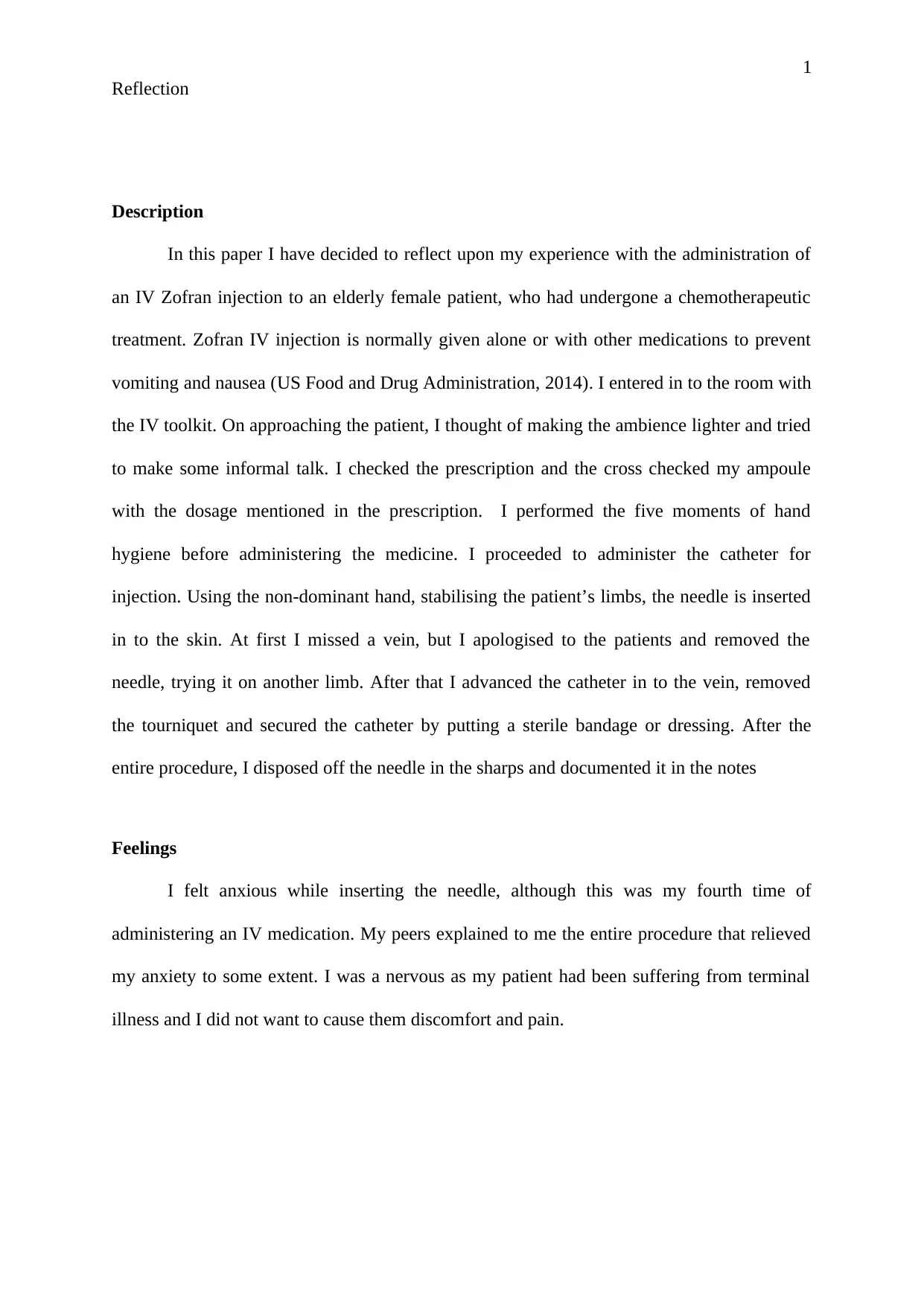
1
Reflection
Description
In this paper I have decided to reflect upon my experience with the administration of
an IV Zofran injection to an elderly female patient, who had undergone a chemotherapeutic
treatment. Zofran IV injection is normally given alone or with other medications to prevent
vomiting and nausea (US Food and Drug Administration, 2014). I entered in to the room with
the IV toolkit. On approaching the patient, I thought of making the ambience lighter and tried
to make some informal talk. I checked the prescription and the cross checked my ampoule
with the dosage mentioned in the prescription. I performed the five moments of hand
hygiene before administering the medicine. I proceeded to administer the catheter for
injection. Using the non-dominant hand, stabilising the patient’s limbs, the needle is inserted
in to the skin. At first I missed a vein, but I apologised to the patients and removed the
needle, trying it on another limb. After that I advanced the catheter in to the vein, removed
the tourniquet and secured the catheter by putting a sterile bandage or dressing. After the
entire procedure, I disposed off the needle in the sharps and documented it in the notes
Feelings
I felt anxious while inserting the needle, although this was my fourth time of
administering an IV medication. My peers explained to me the entire procedure that relieved
my anxiety to some extent. I was a nervous as my patient had been suffering from terminal
illness and I did not want to cause them discomfort and pain.
Reflection
Description
In this paper I have decided to reflect upon my experience with the administration of
an IV Zofran injection to an elderly female patient, who had undergone a chemotherapeutic
treatment. Zofran IV injection is normally given alone or with other medications to prevent
vomiting and nausea (US Food and Drug Administration, 2014). I entered in to the room with
the IV toolkit. On approaching the patient, I thought of making the ambience lighter and tried
to make some informal talk. I checked the prescription and the cross checked my ampoule
with the dosage mentioned in the prescription. I performed the five moments of hand
hygiene before administering the medicine. I proceeded to administer the catheter for
injection. Using the non-dominant hand, stabilising the patient’s limbs, the needle is inserted
in to the skin. At first I missed a vein, but I apologised to the patients and removed the
needle, trying it on another limb. After that I advanced the catheter in to the vein, removed
the tourniquet and secured the catheter by putting a sterile bandage or dressing. After the
entire procedure, I disposed off the needle in the sharps and documented it in the notes
Feelings
I felt anxious while inserting the needle, although this was my fourth time of
administering an IV medication. My peers explained to me the entire procedure that relieved
my anxiety to some extent. I was a nervous as my patient had been suffering from terminal
illness and I did not want to cause them discomfort and pain.
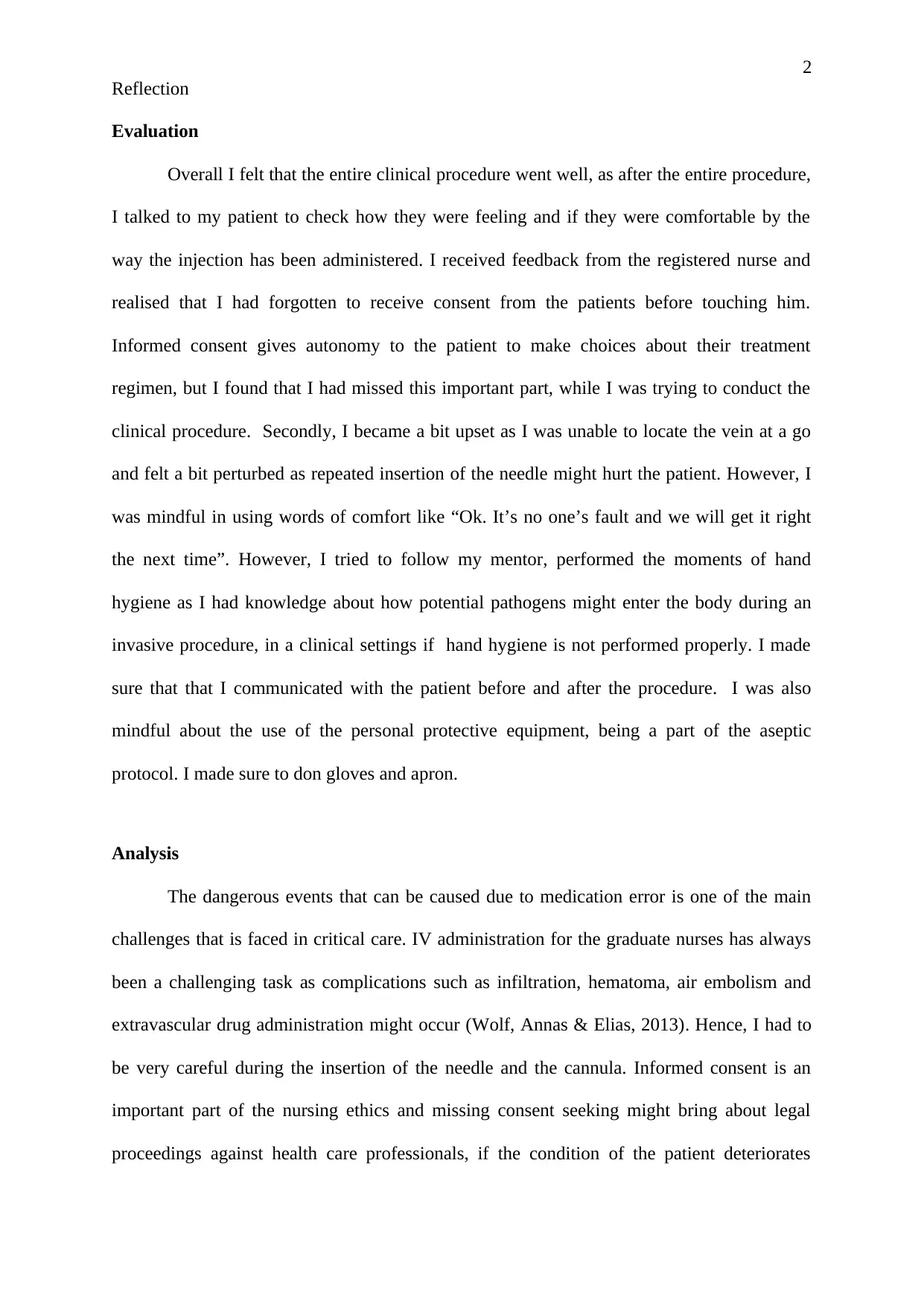
2
Reflection
Evaluation
Overall I felt that the entire clinical procedure went well, as after the entire procedure,
I talked to my patient to check how they were feeling and if they were comfortable by the
way the injection has been administered. I received feedback from the registered nurse and
realised that I had forgotten to receive consent from the patients before touching him.
Informed consent gives autonomy to the patient to make choices about their treatment
regimen, but I found that I had missed this important part, while I was trying to conduct the
clinical procedure. Secondly, I became a bit upset as I was unable to locate the vein at a go
and felt a bit perturbed as repeated insertion of the needle might hurt the patient. However, I
was mindful in using words of comfort like “Ok. It’s no one’s fault and we will get it right
the next time”. However, I tried to follow my mentor, performed the moments of hand
hygiene as I had knowledge about how potential pathogens might enter the body during an
invasive procedure, in a clinical settings if hand hygiene is not performed properly. I made
sure that that I communicated with the patient before and after the procedure. I was also
mindful about the use of the personal protective equipment, being a part of the aseptic
protocol. I made sure to don gloves and apron.
Analysis
The dangerous events that can be caused due to medication error is one of the main
challenges that is faced in critical care. IV administration for the graduate nurses has always
been a challenging task as complications such as infiltration, hematoma, air embolism and
extravascular drug administration might occur (Wolf, Annas & Elias, 2013). Hence, I had to
be very careful during the insertion of the needle and the cannula. Informed consent is an
important part of the nursing ethics and missing consent seeking might bring about legal
proceedings against health care professionals, if the condition of the patient deteriorates
Reflection
Evaluation
Overall I felt that the entire clinical procedure went well, as after the entire procedure,
I talked to my patient to check how they were feeling and if they were comfortable by the
way the injection has been administered. I received feedback from the registered nurse and
realised that I had forgotten to receive consent from the patients before touching him.
Informed consent gives autonomy to the patient to make choices about their treatment
regimen, but I found that I had missed this important part, while I was trying to conduct the
clinical procedure. Secondly, I became a bit upset as I was unable to locate the vein at a go
and felt a bit perturbed as repeated insertion of the needle might hurt the patient. However, I
was mindful in using words of comfort like “Ok. It’s no one’s fault and we will get it right
the next time”. However, I tried to follow my mentor, performed the moments of hand
hygiene as I had knowledge about how potential pathogens might enter the body during an
invasive procedure, in a clinical settings if hand hygiene is not performed properly. I made
sure that that I communicated with the patient before and after the procedure. I was also
mindful about the use of the personal protective equipment, being a part of the aseptic
protocol. I made sure to don gloves and apron.
Analysis
The dangerous events that can be caused due to medication error is one of the main
challenges that is faced in critical care. IV administration for the graduate nurses has always
been a challenging task as complications such as infiltration, hematoma, air embolism and
extravascular drug administration might occur (Wolf, Annas & Elias, 2013). Hence, I had to
be very careful during the insertion of the needle and the cannula. Informed consent is an
important part of the nursing ethics and missing consent seeking might bring about legal
proceedings against health care professionals, if the condition of the patient deteriorates
⊘ This is a preview!⊘
Do you want full access?
Subscribe today to unlock all pages.

Trusted by 1+ million students worldwide
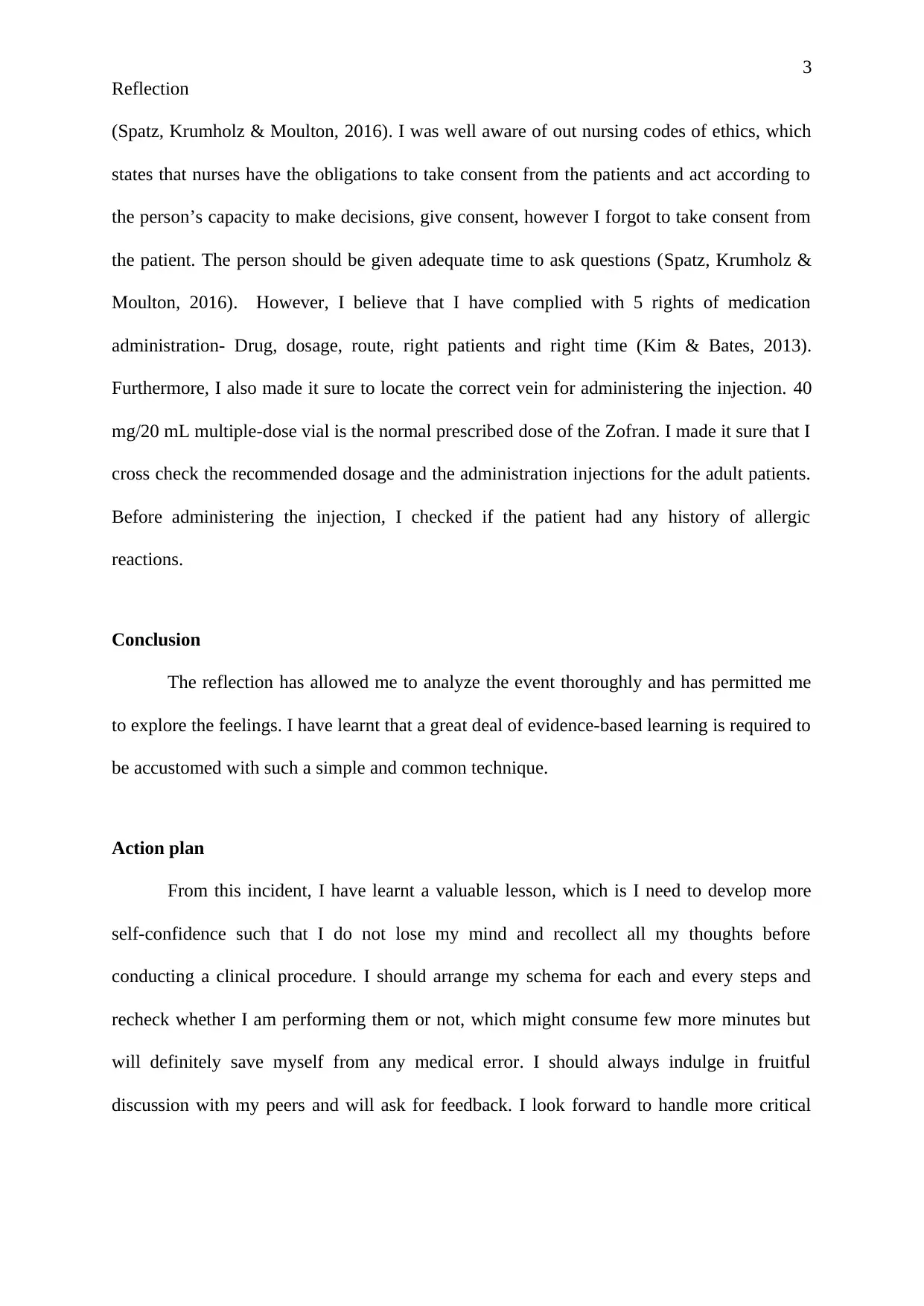
3
Reflection
(Spatz, Krumholz & Moulton, 2016). I was well aware of out nursing codes of ethics, which
states that nurses have the obligations to take consent from the patients and act according to
the person’s capacity to make decisions, give consent, however I forgot to take consent from
the patient. The person should be given adequate time to ask questions (Spatz, Krumholz &
Moulton, 2016). However, I believe that I have complied with 5 rights of medication
administration- Drug, dosage, route, right patients and right time (Kim & Bates, 2013).
Furthermore, I also made it sure to locate the correct vein for administering the injection. 40
mg/20 mL multiple-dose vial is the normal prescribed dose of the Zofran. I made it sure that I
cross check the recommended dosage and the administration injections for the adult patients.
Before administering the injection, I checked if the patient had any history of allergic
reactions.
Conclusion
The reflection has allowed me to analyze the event thoroughly and has permitted me
to explore the feelings. I have learnt that a great deal of evidence-based learning is required to
be accustomed with such a simple and common technique.
Action plan
From this incident, I have learnt a valuable lesson, which is I need to develop more
self-confidence such that I do not lose my mind and recollect all my thoughts before
conducting a clinical procedure. I should arrange my schema for each and every steps and
recheck whether I am performing them or not, which might consume few more minutes but
will definitely save myself from any medical error. I should always indulge in fruitful
discussion with my peers and will ask for feedback. I look forward to handle more critical
Reflection
(Spatz, Krumholz & Moulton, 2016). I was well aware of out nursing codes of ethics, which
states that nurses have the obligations to take consent from the patients and act according to
the person’s capacity to make decisions, give consent, however I forgot to take consent from
the patient. The person should be given adequate time to ask questions (Spatz, Krumholz &
Moulton, 2016). However, I believe that I have complied with 5 rights of medication
administration- Drug, dosage, route, right patients and right time (Kim & Bates, 2013).
Furthermore, I also made it sure to locate the correct vein for administering the injection. 40
mg/20 mL multiple-dose vial is the normal prescribed dose of the Zofran. I made it sure that I
cross check the recommended dosage and the administration injections for the adult patients.
Before administering the injection, I checked if the patient had any history of allergic
reactions.
Conclusion
The reflection has allowed me to analyze the event thoroughly and has permitted me
to explore the feelings. I have learnt that a great deal of evidence-based learning is required to
be accustomed with such a simple and common technique.
Action plan
From this incident, I have learnt a valuable lesson, which is I need to develop more
self-confidence such that I do not lose my mind and recollect all my thoughts before
conducting a clinical procedure. I should arrange my schema for each and every steps and
recheck whether I am performing them or not, which might consume few more minutes but
will definitely save myself from any medical error. I should always indulge in fruitful
discussion with my peers and will ask for feedback. I look forward to handle more critical
Paraphrase This Document
Need a fresh take? Get an instant paraphrase of this document with our AI Paraphraser
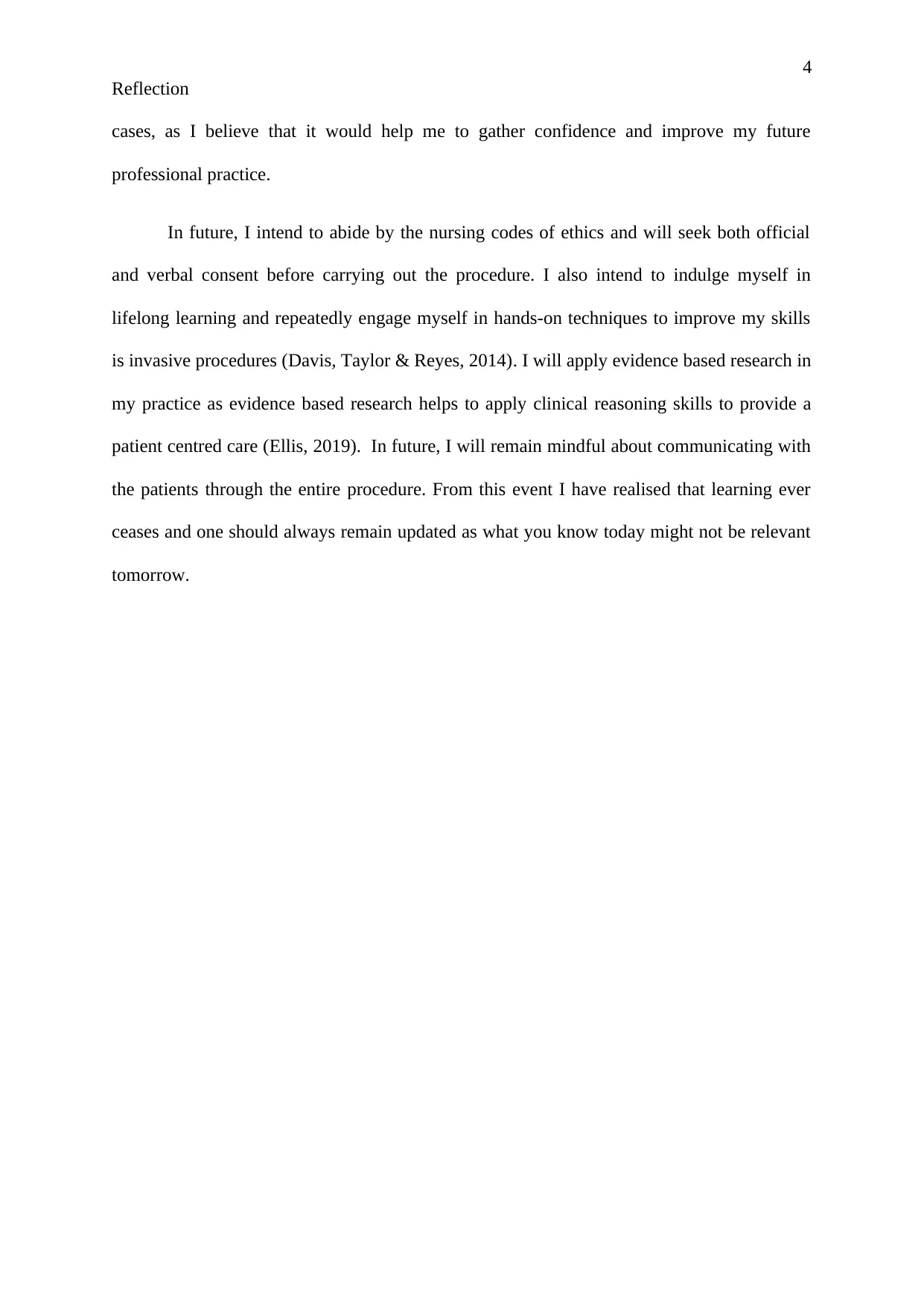
4
Reflection
cases, as I believe that it would help me to gather confidence and improve my future
professional practice.
In future, I intend to abide by the nursing codes of ethics and will seek both official
and verbal consent before carrying out the procedure. I also intend to indulge myself in
lifelong learning and repeatedly engage myself in hands-on techniques to improve my skills
is invasive procedures (Davis, Taylor & Reyes, 2014). I will apply evidence based research in
my practice as evidence based research helps to apply clinical reasoning skills to provide a
patient centred care (Ellis, 2019). In future, I will remain mindful about communicating with
the patients through the entire procedure. From this event I have realised that learning ever
ceases and one should always remain updated as what you know today might not be relevant
tomorrow.
Reflection
cases, as I believe that it would help me to gather confidence and improve my future
professional practice.
In future, I intend to abide by the nursing codes of ethics and will seek both official
and verbal consent before carrying out the procedure. I also intend to indulge myself in
lifelong learning and repeatedly engage myself in hands-on techniques to improve my skills
is invasive procedures (Davis, Taylor & Reyes, 2014). I will apply evidence based research in
my practice as evidence based research helps to apply clinical reasoning skills to provide a
patient centred care (Ellis, 2019). In future, I will remain mindful about communicating with
the patients through the entire procedure. From this event I have realised that learning ever
ceases and one should always remain updated as what you know today might not be relevant
tomorrow.
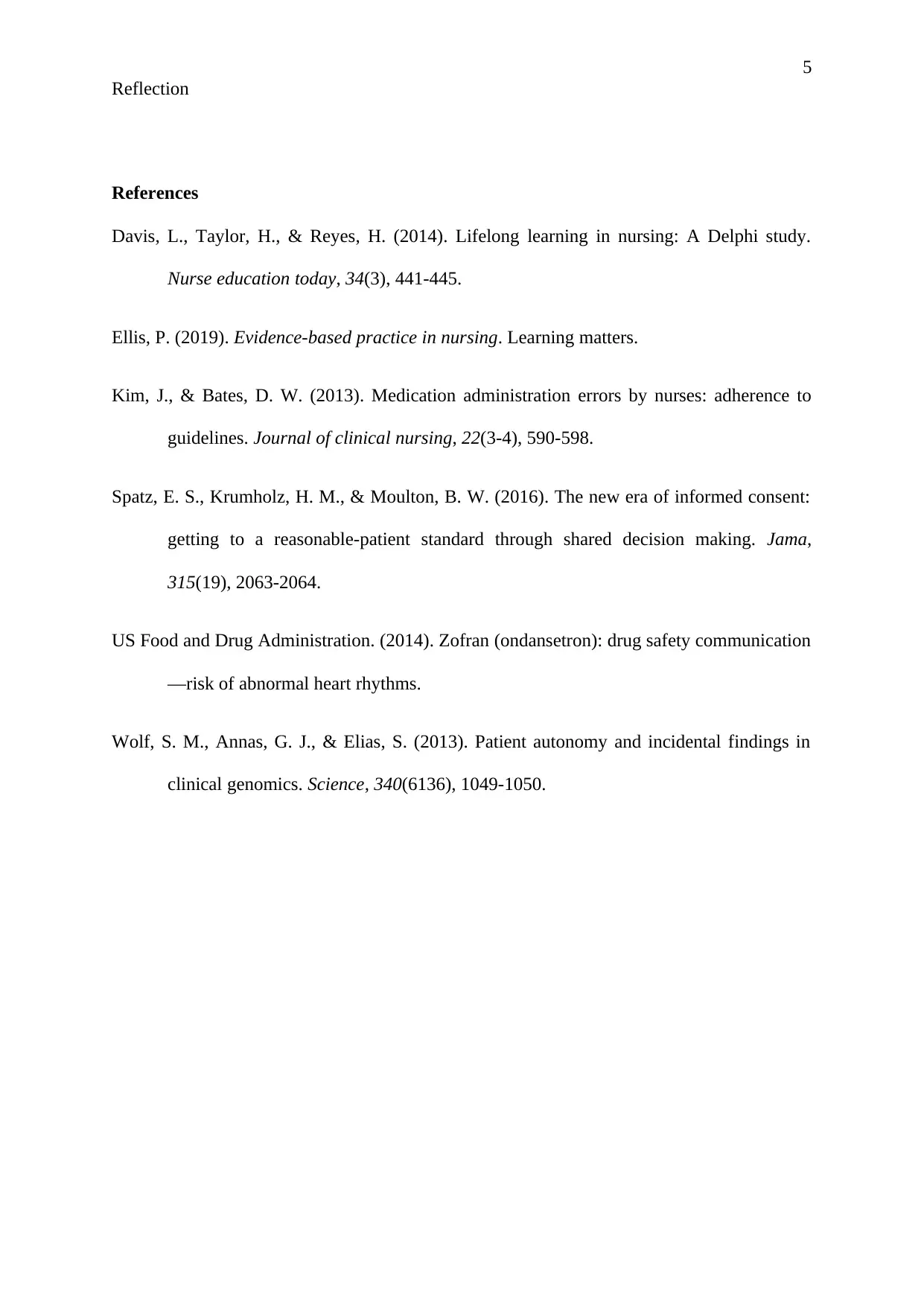
5
Reflection
References
Davis, L., Taylor, H., & Reyes, H. (2014). Lifelong learning in nursing: A Delphi study.
Nurse education today, 34(3), 441-445.
Ellis, P. (2019). Evidence-based practice in nursing. Learning matters.
Kim, J., & Bates, D. W. (2013). Medication administration errors by nurses: adherence to
guidelines. Journal of clinical nursing, 22(3-4), 590-598.
Spatz, E. S., Krumholz, H. M., & Moulton, B. W. (2016). The new era of informed consent:
getting to a reasonable-patient standard through shared decision making. Jama,
315(19), 2063-2064.
US Food and Drug Administration. (2014). Zofran (ondansetron): drug safety communication
—risk of abnormal heart rhythms.
Wolf, S. M., Annas, G. J., & Elias, S. (2013). Patient autonomy and incidental findings in
clinical genomics. Science, 340(6136), 1049-1050.
Reflection
References
Davis, L., Taylor, H., & Reyes, H. (2014). Lifelong learning in nursing: A Delphi study.
Nurse education today, 34(3), 441-445.
Ellis, P. (2019). Evidence-based practice in nursing. Learning matters.
Kim, J., & Bates, D. W. (2013). Medication administration errors by nurses: adherence to
guidelines. Journal of clinical nursing, 22(3-4), 590-598.
Spatz, E. S., Krumholz, H. M., & Moulton, B. W. (2016). The new era of informed consent:
getting to a reasonable-patient standard through shared decision making. Jama,
315(19), 2063-2064.
US Food and Drug Administration. (2014). Zofran (ondansetron): drug safety communication
—risk of abnormal heart rhythms.
Wolf, S. M., Annas, G. J., & Elias, S. (2013). Patient autonomy and incidental findings in
clinical genomics. Science, 340(6136), 1049-1050.
⊘ This is a preview!⊘
Do you want full access?
Subscribe today to unlock all pages.

Trusted by 1+ million students worldwide
1 out of 6
Related Documents
Your All-in-One AI-Powered Toolkit for Academic Success.
+13062052269
info@desklib.com
Available 24*7 on WhatsApp / Email
![[object Object]](/_next/static/media/star-bottom.7253800d.svg)
Unlock your academic potential
Copyright © 2020–2026 A2Z Services. All Rights Reserved. Developed and managed by ZUCOL.




